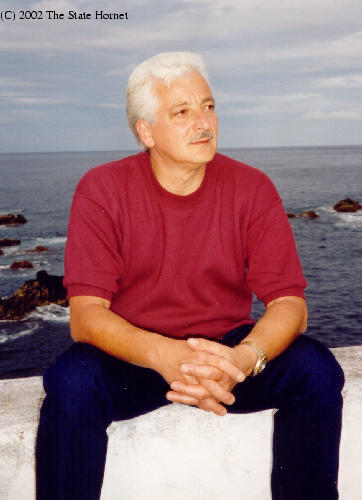Rememberance for psychology professor

Image: Rememberance for psychology professor:Professor’s death and dying class was among the most popular on campus.Photo Courtesy Elayne Azevedo Marrone:
January 29, 2002
He was the campus expert on death and dying who showed his students how to live, a published academician who was a frustrated author, and a deeply meditative man who loved banging on conga drums.
Robert Lawrence Marrone died Dec. 21, of pulmonary fibrosis. He was 60 years old.
Friends, colleagues and family will gather this Sunday to remember the life of the popular Sac State psychology professor who one news writer described as “a dynamic gentleman with plenty of panache.”
Dr. Marrone’s course on the psychology of death and dying was popular with students, and they wrote enthusiastically about him when asked to evaluate their learning experience in his classes.
“I have bragged about him to other students,” wrote one undergraduate.
“The class on death and dying gave students a chance to ask questions we couldn’t have asked any other professor,” wrote another.
“He was so popular. His classes were always full,” said Connie Chiechi, the administrative support coordinator for the psychology department. “Three weeks after he died we were still getting phone calls from his students.”
Dr. Marrone was born in Brooklyn, N.Y., the eldest of three children. A graduate of Adelphi University in Garden City, N.Y., he earned a doctorate from Texas Christian University in Forth Worth, Texas.
He returned to Brooklyn as a research psychologist at Downstate Medical Center before coming to Sac State in 1968.
He soon became one of the most popular professors in the psychology department, authoring several articles and books including, “Death, Mourning and Caring” (Brooks/Cole Publishing Co., 1997). He was working on a second edition prior to his illness.
Dr. Marrone also maintained a private practice as a clinical psychologist. In the 1980s he co–founded the Sierra Center for the Healing Arts in Nevada City and Coyote University. He also served as coordinator of the Experimental Studies and Honors Program at Sac State.
Yet Dr. Marrone was no stuffy academician.
“Bob was a frustrated creative writer,” said his wife, Elayne. “He always had something in process, and he really wanted to publish a novel.”
As a high school sophomore, he sang bass as a member of the Pentones, performing Tin Pan Alley hits at local dances.
“I decided that a 98–pound bass singer of rhythm and blues had very limited career opportunities,” he said in an interview in 1980. “I did well in high school and went off to college. The rest is, as they say, boring.”
Dr. Marrone lived the message of a sign in his home office: “You must be present to win. –The Management.”
“He was always there for us,” one student wrote after taking his class.
He showed compassion for family and complete strangers.
On many occasions he endured the jibes of friends and family for feeding table scraps to his cocker spaniel, Ronya. “They’d tease Bob, ‘You’re going to kill that dog,'” Mrs. Marrone recalled. “Of course she lived to be 18 years old, and for the last few months of her life when she couldn’t see and could barely walk, Bob attended to her every need.”
He once gave a homeless man a sleeping bag and sandwiches after finding him living under a bridge.
He was a volunteer for Mercy Hospice, where he counseled terminally ill patients and their families.
“Bob was a good friend and a role model,” said psychology professor Martin Rogers. “I marveled at his creativeness, openness to new ideas and good humor.”That humor cropped up even when he was diagnosed with pulmonary fibrosis last October.”Bob returned from his medical appointment and laughed and said, ‘The good news is that I have pneumonia. The bad news is that I have lung disease,'” his wife said.
As his death drew near, Dr. Marrone spent time with friends and family. He spent time in meditation and gardening. He danced with his wife and shared a last family meal with his parents.
When death came, he accepted it in the same calm way he had always discussed dying with his students.
“It was very peaceful, just as he would have wanted,” Mrs. Marrone said.
Dr. Marrone is survived by his wife, Elayne Azevedo Marrone, and his son from his first marriage to Susan Hayward, Jason Marrone.
Other survivors include his parents, Ernest and Joan Marrone of Sacramento; sister, Joann Ferrigno of Carmichael; and brother, Fred Marrone of Tarzana, Calif.
A memorial celebration is scheduled for 2 p.m. Sunday in the Forest Suite of the University Union.
The family asks that contributions be made to The American Lung Association or other charity in lieu of flowers.

























































































































